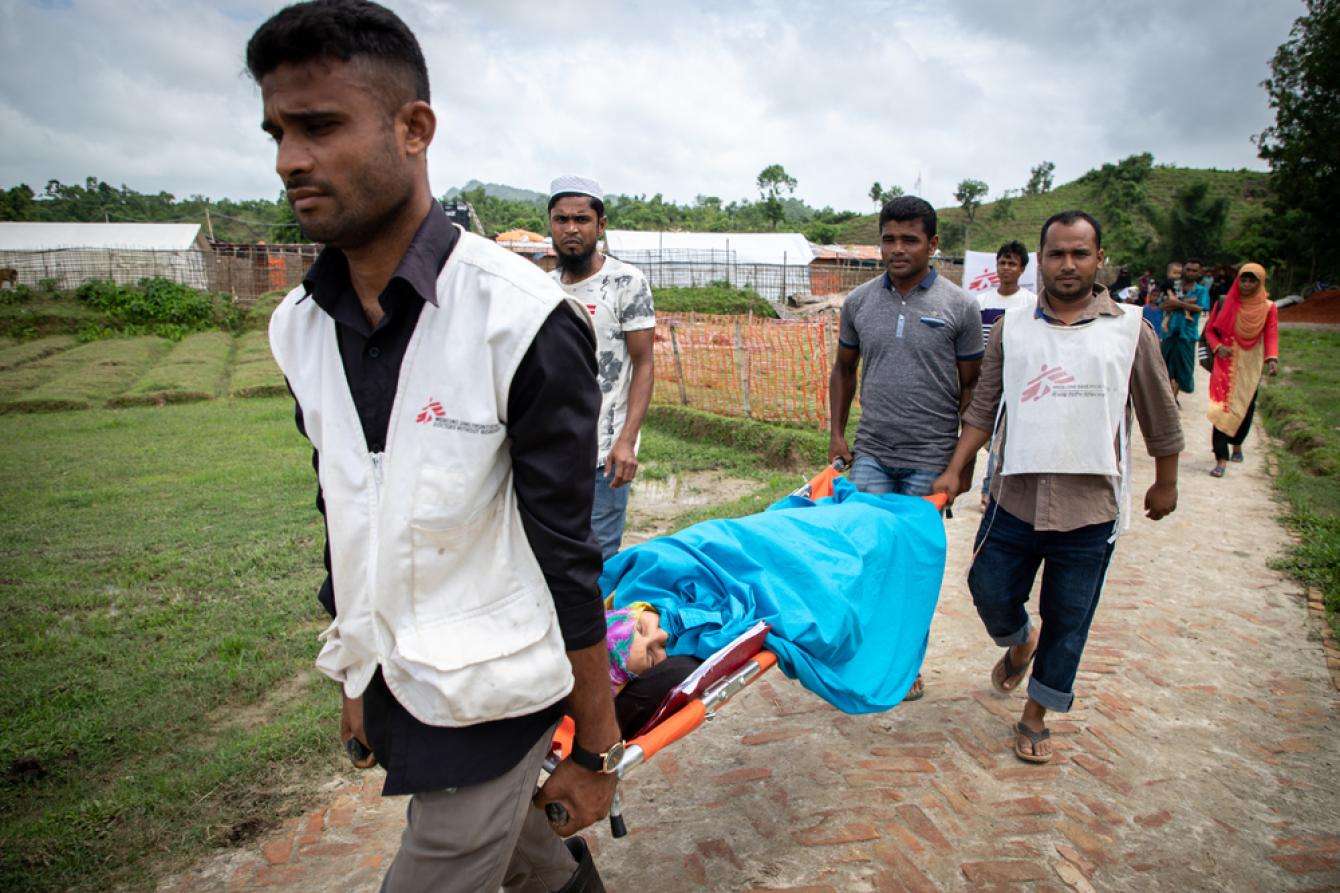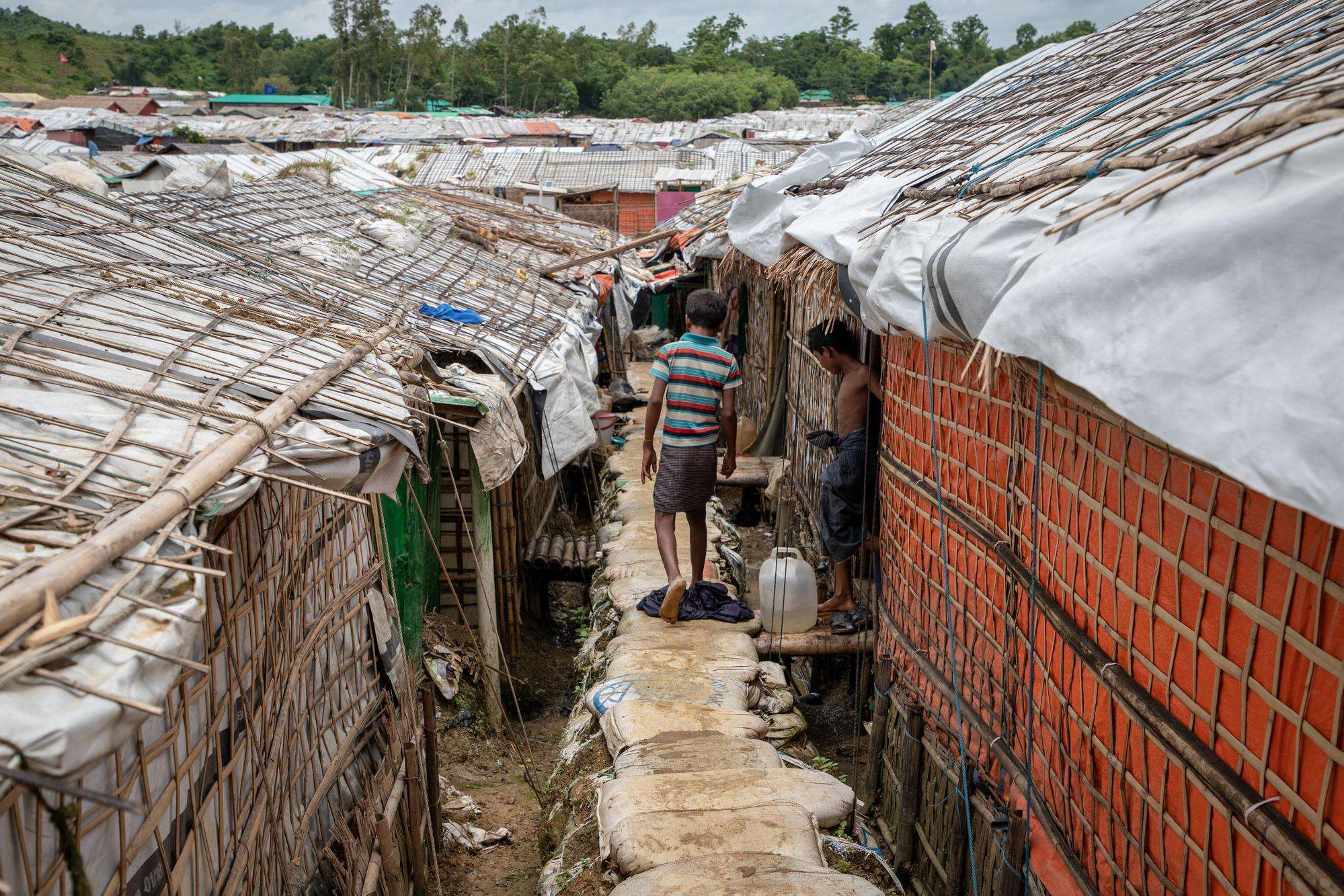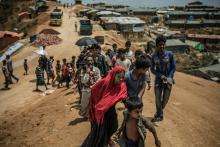More than 919,000 Rohingya refugees are now in Cox’s Bazar district, living in small bamboo and plastic sheeting shelters on uneven terrain in severely overcrowded makeshift camps. Relocations during the monsoon season, to additional land provided by the government, have prioritized families at immediate risk of landslides and flooding, with limited progress on reducing overcrowding. More suitable land is needed.
Hilly terrain also complicates access to health services, particularly for pregnant women, older people, and people living with disabilities. Overcrowding, inhospitable terrain, long distances, and concerns over safety have a disproportionate impact on women’s and girls’ ability to access services. Young, unmarried women in particular are often discouraged from moving beyond their immediate neighborhoods.
Access to water, sanitation, hygiene, and other infrastructure is limited. Monsoon season, though milder than expected, brought intense rains that caused flooding and landslides in the camps and local communities and led to injuries, deaths, and damage to infrastructure, including latrines. Cyclone season is now approaching.
The majority of Rohingya refugees in Bangladesh, including all new arrivals, do not have refugee status. They also lack access to education and other essential services. Their movements outside the camps are restricted, further hampering access to services, including health care, and they are not able to work.
MSF medical teams continue to see patients suffering from diarrhea, respiratory tract infections, and skin conditions, which are linked to poor living conditions. Vaccination coverage also remains low.

Recent developments
Continued arrivals
More than 13,000 people have been registered by United Nations High Commissioner for Refugees as new arrivals so far in 2018. This number includes people who have also been forced out or asked to leave their homes within the host community and move to refugee camps. Those arriving from Myanmar tell MSF teams of continuing violence, harassment, detention, and coerced registration as “non-citizens.” Border controls on both sides of the border have reportedly been intensified, making it more difficult for refugees to reach Bangladesh.
The island
Bangladesh plans to start relocating Rohingya refugees to Bhasan Char, a remote island in the Bay of Bengal. It is intended to eventually house 100,000 people, beginning with 50 to 60 families who may be relocated as early as October. This small island, however, only emerged from the sea in 2006 and there are serious concerns that it could be vulnerable to extreme weather. There are also concerns that Rohingya refugees will not be able to leave the island even for medical treatment.
Insecurity, violence, and protection
Refugees report concerns about violent attacks in the camps, including abductions and kidnappings. MSF teams hear stories from patients and Rohingya volunteers report fearing for their safety. In response, many camp authorities have introduced curfews and law enforcement patrols have been increased, particularly at night. MSF is concerned that curfews could prevent patients from accessing emergency health care during the night.
Possible reduction in activities of other organizations
MSF is concerned that other organizations working in the camps may begin to reduce their activities due to lack of funding. While some consolidation of activities is necessary to avoid overlap, including for MSF, any significant reduction in activities of other organizations in the near future risks leaving serious gaps and potentially overwhelming MSF’s existing capacity to provide medical care.
Cyclone season preparations
Cyclone season will begin in October. Emergency measures like evacuation plans and cyclone shelters, however, are not available to refugees. MSF and other organizations are preparing to respond but most buildings in the camps, including medical facilities, are temporary structures made of bamboo and plastic sheeting, so storms are likely to cause serious damage. Cyclones also bring heavy rains that could cause further flooding and landslides.
Uncertainty about the future
The uncertainty about their future remains a major concern for refugees and continues to affect their health. Any return of the refugees to Myanmar must be voluntary, safe, and dignified. MSF continues to call on governments able to influence Myanmar, to press for an end to violence and discrimination against Rohingya, for refugees to be able to return to their place of origin, for the lifting of restrictions to freedom of movement for Rohingya remaining in Myanmar, tf and for access for humanitarian organizations. In the meantime, Rohingya people in Bangladesh must be granted refugee or other legal status and have access to services.

Still no longer-term solutions in the camps
There is a need for longer-term planning to secure a safer and sustainable living environment for the Rohingya refugees, including continued international support. Camp-level planning must bring infrastructure up to minimum standards.
MSF operations overview

Summary
| MSF Health Facilities: | Four inpatient health facilities (hospital-level facility), five primary health centers, eight health posts, and one outbreak response center. |
| MSF Staff: | More than 2,000 MSF staff and over 1,000 volunteers. |
| Patients: | MSF has treated 843,800 patients at outpatient facilities and admitted 15,434 patients since August 2017. |
| Main morbidities: | Respiratory infections, diarrheal diseases, and skin diseases. |
| Water and sanitation activities: |
Drilling boreholes, setting up water distribution systems, desludging old latrines, bucket chlorination, and water filter distribution. |
| Outreach: |
Focus on health promotion in both refugee and host communities, investigating possible outbreaks, vaccination campaigns, and maintaining links with the community and other actors. |
| Surveillance: |
Surveillance of the epidemiological situation in the camps, through collection of household data on demographic, mortality, birth, and nutritional indicators to monitoring and anticipate health needs. |
Current health concerns
Secondary health care and surgical care
There are concerns about whether there are currently enough inpatient beds to meet the needs of the Rohingya and Bangladeshi populations. MSF is one of the main actors providing hospitalization for pediatric, neonatal, and adult patients. Non-communicable diseases also remain a serious unmet need. Surgical capacity is a concern, as surgical facilities within the camps are limited and may be reduced in the future. Both international and national actors need more support, including funding, to scale up secondary and surgical care.
MSF has been able to refer patients to facilities in Cox’s Bazar. This may become more difficult if movement restrictions on Rohingya patients increase.
Routine vaccinations
MSF is working with the Government of Bangladesh to expand routine vaccinations for Rohingya refugees. Currently, vaccinations are available for children up to one year old. We hope this will be expanded to all children under five years to address historically low vaccination coverage among the Rohingya, due to limited access to health care in Myanmar, and to prevent communicable diseases.
Mental health
Only a small proportion of the population currently has access to specialized mental health services, like those provided at MSF facilities. The traumatic experiences that forced them to flee Myanmar, the hazardous journey, the daily stresses of camp life, and uncertainty over their future, all affect their mental health. Refugees experience flashbacks, generalized anxiety, panic attacks, recurring nightmares, and insomnia, as well as illnesses such as post-traumatic stress disorder and major depression. MSF is also seeing chronic mental health difficulties and psychiatric needs within both the host and refugee communities.
Sexual and gender-based violence (SGBV)
Progress has been made in putting in place SGBVprevention, mitigation, and response mechanisms, but coverage and service delivery remains patchy. MSF teams continue to provide support and treatment to survivors of sexual violence at our health facilities. Since August 2017, MSF has treated more than 600 survivors. Survivors report experiencing sexual violence both in Myanmar and in the camps. MSF’s services include psychosocial care, treatment for sexually-transmitted infections, and menstrual regulation (Bangladeshi medical term for termination of unplanned pregnancies). Post-exposure prophylaxis is also provided in the cases where it is possible.
Water and sanitation
Given the scale of the water and sanitation needs, MSF’s water and sanitation response has shifted to focus on larger projects to distribute clean, treated water, and the management of waste from latrines. Maintenance of existing facilities, chlorination points, and distribution of aquafilters continues.

Clean water
While the distribution of aquafilters to patients leaving the hospital and identified vulnerable households continue, other activities will be gradually phased out as MSF focuses on the development of water distribution systems. Several systems are already in operation. One of the systems under construction is a solar-powered water networks to bring clean, chlorinated water to 81,000 refugees.
The system will allow for “in-line chlorination” which means that water is treated as soon as it is pumped out of the borehole. The chlorine in the water ensures that the water is safe while it is stored in the large water tanks (between 75,000 and 90,000 liters each). Once the water is collected from taps near people’s shelters, the chlorine keeps the water safe as it is stored in the household.
MSF health facilities and activities in Cox’s Bazar district
MSF operates four hospital-level inpatient facilities in the Cox’s Bazar district: Kutupalong IPD, Balukhali IPD, the Hospital on the Hill (Kutupalong-Balukhali mega-camp), and Goyalmara Mother and Child Hospital between Moynarghona and Unchiprang camps.
Goyalmara Mother and Child Hospital and Kutupalong IPD are located just outside of the camps and serve both camp and host populations. Indeed, 40 per cent of patients at Goyalmara are from the host community.
The four hospital-level facilities offer a range of services including:
- Emergency, outpatient departments and inpatient departments, and isolation beds/wards,
- Sexual and reproductive health services, including maternity, neonatal and pediatric facilities,
- Mental health services,
- Sexual and gender violence services, and
- Laboratory services.
Goyalmara Mother and Child Hospital and Kutupalong IPDs are located just outside of the camps and serve both camp and host populations. 40 percent of patients at Goyalmara are from the host community.
Rubber Garden outbreak response center was, until recently, used as a diphtheria treatment center, as well as treating acute watery diarrhea (AWD). Over the last two months, the number of diphtheria patients has dropped to just two to three per day, making it no longer necessary for a separate diphtheria center. Patients will just be treated in isolation areas of MSF hospitals. AWD patients have also been referred. Rubber Garden will be reactivated in the case of an outbreak.
Primary Health Centers (PHCs)
MSF operates five primary health centers in the camps south of the Kutupalong-Balukhali mega-camp (in Hakimpara, Jamtoli, Moynarghona, Unchiprang, and Nayapara camps).
These PHCs are outpatient facilities that provide primary health care, as well as 24-hour emergency and ambulance referral, mental health, and SGBV services. Each PHC sees 200 to 300 patients a day.
Medical teams at Hakimpara, Jamtoli, and Moynarghona PHCs are revising protocol to focus on constantly improving the quality of care. MSF teams are also working with local communities and health facilities to improve outbreak readiness and infection prevention and control.
Unchiprang PHC was damaged by strong winds earlier in the year but has now been repaired. At Nayapara PHC, construction has begun on a maternity facility. Nayapara PHC will also start a mobile clinic program in October to bring health care closer to where people live.'
Health posts/outpatient departments (OPDs) and mobile clinic
MSF runs eight health posts/OPDs in Kutupalong-Balukhali camp. They provide basic primary health care, including vaccinations, and sexual and reproductive health and mental health services. Some also provide follow-up for non-communicable diseases (NCD) patients. NCDs currently being treated include hypertension, diabetes, chronic obstructive pulmonary disease, asthma, and epilepsy.
The mobile clinic that was providing screening, consultations, and referral at the Sabrang entry point, where many refugees arrived last year, is on standby as very few people are arriving at this point. An MSF social worker continues to monitor the situation and the mobile clinic can be reactivated quickly if needed.
Other Activities
Rubber Garden multi-outbreak response center
Rubber Garden outbreak response center is now an emergency facility that can be activated in case of an outbreak of a communicable disease like cholera or diphtheria. It has a capacity of 100 beds. It is one of the few dedicated facilities that would be available in the case of an outbreak, as finding space to implement isolation and treatment activities in the Kutupalong-Balukhali mega-camp is extremely challenging.
Supporting existing government health facilities
In Cox’s Bazar town, MSF is starting construction at Sadar Hospital, one of the main hospitals in the town. MSF is building a brand new waste management area for the hospital to improve infection prevention and control. The hospital serves both host and Rohingya populations. In addition, MSF is supporting mental health services at Ukhiya Upazila Health Complex in Ukhiya town, near the largest of the refugee camps. In August, MSF also donated and installed an x-ray machine at the Teknaf Upazila Health Complex and provided staff training.
Other projects in Bangladesh
In Kamrangirchar, a slum in the capital, Dhaka, MSF runs an occupational health program for local factory workers. The team also provides medical and psychological support to victims of sexual violence and intimate partner violence, and reproductive health care to adolescent girls, carrying out antenatal consultations and assisting deliveries. In addition, MSF offers family planning sessions and individual mental health consultations.
Doctors Without Borders/Médecins Sans Frontières (MSF) first established projects in Bangladesh in 1985 and has had a continuous presence in the country since 1992. Before August 2017, MSF had one project in Kutupalong in Cox’s Bazar and one in Kamrangirchar, a slum area of the capital, Dhaka. After more than 700,000 Rohingya refugees fled violence in Myanmar in August 2017, MSF launched additional emergency projects.





